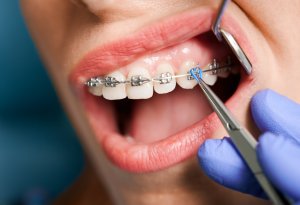When you are first getting adult braces, your orthodontist will let you know when they need to see you again. They will check your teeth and your braces at your next orthodontics appointment and ensure that everything is moving as planned. Then, they will tighten your braces. But how are braces tightened?
If you are new to the procedure, you might not understand why you need your braces tightened. However, the proper amount of pressure must be kept on your teeth, and tightening makes this happen.
In this article, we’ll talk about:
- How to get your braces tightened
- How often you should get them adjusted
- Dealing with the pain
- Why wire adjustments are important
Why orthodontists tighten braces
Getting your braces tightened is part of regular treatment maintenance. Your teeth move very slowly, but the wires can loosen over time. Tightening the braces keeps the right amount of pressure on your teeth, moving everything into its proper place. Aligners work similarly but straighten teeth without braces, or at least, not traditional brackets.


When getting braces, your orthodontist will likely tell you to come back for monthly appointments. During those meetings, they should adjust and tighten your wires. Your teeth may feel uncomfortable with the additional pressure. Soft foods, like mashed potatoes, are better to help reduce the amount of pain you feel.
Talk with your orthodontist if the soreness persists for a week after adjusting. Too much sensitivity could be a sign that something is wrong.
What to expect when your braces are tightened
After your braces are tightened, you can expect to feel sore for a couple of days. There shouldn’t be intense pain. You will get used to the feeling of extra pressure the longer you have to wear the braces.
Do braces hurt when you get them tightened?


Many patients feel sore for a few days after having brackets tightened. However, you won’t feel as much pain as you did when your traditional braces were first applied. After a few days, you should get used to the new pressure. For relief, you should take over-the-counter medicine for pain relief if the braces pain is that bad.
Many patients feel nervous the first time they have their braces tightened, but you will get used to it over time. And just remember that it’s a necessary adjustment in the process of straightening your smile.
It’s normal to struggle a bit with chewing food after tightening. If you feel uncomfortable, you can eat soup, smoothies, and other soft foods for a day after tightening. This provides relief for many people with sensitive teeth and gums.
Brushing your teeth can also be a little tender, but learn how to brush teeth with braces and try to avoid some irritation.
How often do you have to get your braces tightened?
You will need to have your braces tightened at least every six weeks. Your treatment may require slightly more or less time between tightening, so follow the instructions of your orthodontist.
How do orthodontists tighten braces?
One thing your orthodontist will do is apply new elastic bands. Over time, the bands tend to stretch. To keep the same amount of pressure on your teeth, you need new elastics.
Your ortho also will likely make sure the wires are tightened. These metal wires connect to the brackets, which move teeth slowly into position. During treatment, you can expect to get your braces tightened every 4 to 6 weeks. You shouldn’t feel pain, but it may be uncomfortable as you adjust to the new pressure.
Tightening braces process
To straighten your teeth, you’ll need to get the wires of your braces adjusted by your orthodontist every 4 to 6 weeks. You may feel discomfort in your mouth, but it’s manageable.
Straightening teeth with braces is a process. About 6 weeks after your braces are put on you’ll find yourself back in the orthodontist’s chair so he or she can make an important adjustment. This routine will continue for the duration of treatment.
The first step to braces tightening is to disconnect the brackets from the archwire. Then, your orthodontist will examine your teeth to see what kind of progress has been made and adjust accordingly. The archwire might be changed if necessary before the braces are reconnected.
As is the case when your braces are first put on, there might be some minor pain and discomfort for a few days as your teeth get used to the pressure and movement. Eating soft foods and taking over-the-counter pain relievers is almost always enough to get through it.
Dr. Clarke Stevens – Braces Omaha
The adjustment process is as follows:
- The rubber bands are removed.
- The archwire is removed.
- The dentist inspects your teeth and how they are adjusting. They may attach a new archwire or put the old one back in.
- Finally, new rubber bands are applied to the brackets and the archwire.
Many patients going through the treatment say that most of the discomfort comes from the new rubber bands being added in. However, with each tightening, the discomfort you experience should lessen. Some people never feel pain from their braces, but for most it can be a little painful.
Once the appointment is finished, you will want to check on your archwires. If they are poking the inside of your mouth, ask the orthodontist to cut them before you leave. Wires that are too long can cause a lot of soreness, making it harder to eat. They can even lead to an infection if not taken care of.
Finally, many patients take over-the-counter pain medication after their wire tightening appointment. It helps them manage the discomfort and soreness from the treatment.
What happens if you don’t get your braces tightened?
If you don’t go to the office for your appointments, you disrupt treatment. Mainly, it will take a much longer time to finish, so attend these appointments if you don’t want to extend treatment.
Additionally, your orthodontist will make sure your gums and teeth are adjusting correctly to the braces wire. If something is going wrong, it’s better to find out about it sooner rather than later. You will save yourself greater expenses and extended braces treatment time.
Never skip your braces tightening appointments
You should show up to every tightening appointment you are assigned. While you may experience discomfort, it can help you keep your wire and brackets aligned. Plus, pressure is needed to maintain adjustments to misaligned teeth.
If you have Invisalign, you also should attend all of your appointments. The office will print a new clear aligner for you, which works to slowly move your teeth. Without the visit, your teeth won’t move further. You may experience some tightness in your mouth with Invisalign, just like you would with metal braces.
When you skip an appointment, you put yourself at risk of damaging your teeth. Treatment can take longer without the proper pressure, and your teeth may move into the wrong spots. It’s always worth checking in with your dentist or orthodontist each month — they will let you know if everything is going smoothly. If it’s not, they’ll fix it.
Conclusion
Do you need braces? When you get braces, you can’t just leave them on and forget about them until your treatment time is up. If you did, you’d be leaving out an essential part of the process — getting your braces tightened.
Tightening or adjusting the wires of your braces happens every 4 to 6 weeks, and it can only be done in-person by your orthodontist. While you probably won’t feel any pain during the appointment itself, you may feel some pain and discomfort in the hours and days after.
You can take over-the-counter pain medication to help ease the pain, and no matter what, don’t skip your tightening appointments!




